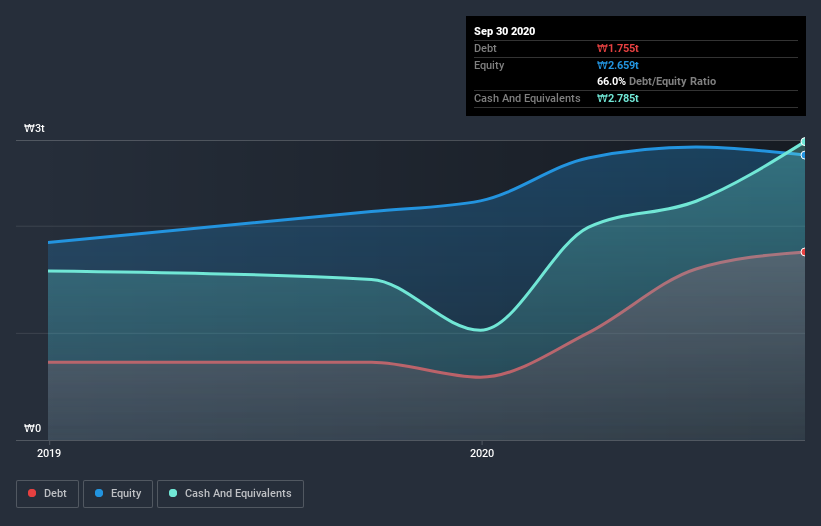
The external fund manager backed by Berkshire Hathaway's Charlie Munger, Li Lu, makes no bones about it when he says 'The biggest investment risk is not the volatility of prices, but whether you will suffer a permanent loss of capital.' It's only natural to consider a company's balance sheet when you examine how risky it is, since debt is often involved when a business collapses. We can see that HDC Hyundai Development Company (KRX:294870) does use debt in its business. But should shareholders be worried about its use of debt?
When Is Debt A Problem?
Debt assists a business until the business has trouble paying it off, either with new capital or with free cash flow. Part and parcel of capitalism is the process of 'creative destruction' where failed businesses are mercilessly liquidated by their bankers. While that is not too common, we often do see indebted companies permanently diluting shareholders because lenders force them to raise capital at a distressed price. By replacing dilution, though, debt can be an extremely good tool for businesses that need capital to invest in growth at high rates of return. The first step when considering a company's debt levels is to consider its cash and debt together.
See our latest analysis for HDC Hyundai Development
How Much Debt Does HDC Hyundai Development Carry?
As you can see below, at the end of September 2020, HDC Hyundai Development had ₩1.76t of debt, up from ₩726.7b a year ago. Click the image for more detail. But it also has ₩2.78t in cash to offset that, meaning it has ₩1.03t net cash.

A Look At HDC Hyundai Development's Liabilities
We can see from the most recent balance sheet that HDC Hyundai Development had liabilities of ₩2.24t falling due within a year, and liabilities of ₩1.09t due beyond that. On the other hand, it had cash of ₩2.78t and ₩725.6b worth of receivables due within a year. So it actually has ₩184.6b more liquid assets than total liabilities.
This surplus suggests that HDC Hyundai Development has a conservative balance sheet, and could probably eliminate its debt without much difficulty. Succinctly put, HDC Hyundai Development boasts net cash, so it's fair to say it does not have a heavy debt load!
The modesty of its debt load may become crucial for HDC Hyundai Development if management cannot prevent a repeat of the 42% cut to EBIT over the last year. Falling earnings (if the trend continues) could eventually make even modest debt quite risky. The balance sheet is clearly the area to focus on when you are analysing debt. But it is future earnings, more than anything, that will determine HDC Hyundai Development's ability to maintain a healthy balance sheet going forward. So if you're focused on the future you can check out this free report showing analyst profit forecasts.
Finally, a company can only pay off debt with cold hard cash, not accounting profits. HDC Hyundai Development may have net cash on the balance sheet, but it is still interesting to look at how well the business converts its earnings before interest and tax (EBIT) to free cash flow, because that will influence both its need for, and its capacity to manage debt. During the last two years, HDC Hyundai Development produced sturdy free cash flow equating to 67% of its EBIT, about what we'd expect. This cold hard cash means it can reduce its debt when it wants to.
Summing up
While we empathize with investors who find debt concerning, you should keep in mind that HDC Hyundai Development has net cash of ₩1.03t, as well as more liquid assets than liabilities. The cherry on top was that in converted 67% of that EBIT to free cash flow, bringing in ₩186b. So we are not troubled with HDC Hyundai Development's debt use. When analysing debt levels, the balance sheet is the obvious place to start. However, not all investment risk resides within the balance sheet - far from it. We've identified 5 warning signs with HDC Hyundai Development (at least 2 which are potentially serious) , and understanding them should be part of your investment process.
If, after all that, you're more interested in a fast growing company with a rock-solid balance sheet, then check out our list of net cash growth stocks without delay.
If you’re looking to trade HDC Hyundai Development, open an account with the lowest-cost* platform trusted by professionals, Interactive Brokers. Their clients from over 200 countries and territories trade stocks, options, futures, forex, bonds and funds worldwide from a single integrated account. Promoted
Valuation is complex, but we're here to simplify it.
Discover if HDC Hyundai Development might be undervalued or overvalued with our detailed analysis, featuring fair value estimates, potential risks, dividends, insider trades, and its financial condition.
Access Free AnalysisThis article by Simply Wall St is general in nature. It does not constitute a recommendation to buy or sell any stock, and does not take account of your objectives, or your financial situation. We aim to bring you long-term focused analysis driven by fundamental data. Note that our analysis may not factor in the latest price-sensitive company announcements or qualitative material. Simply Wall St has no position in any stocks mentioned.
*Interactive Brokers Rated Lowest Cost Broker by StockBrokers.com Annual Online Review 2020
Have feedback on this article? Concerned about the content? Get in touch with us directly. Alternatively, email editorial-team (at) simplywallst.com.
About KOSE:A294870
HDC Hyundai Development
Operates as a financial real estate company, provides real estate services primarily in South Korea.
Undervalued with moderate growth potential.
Market Insights
Community Narratives


